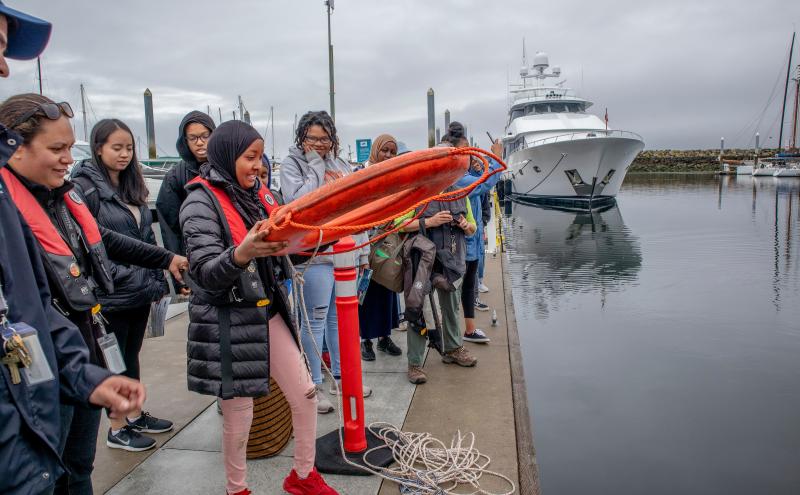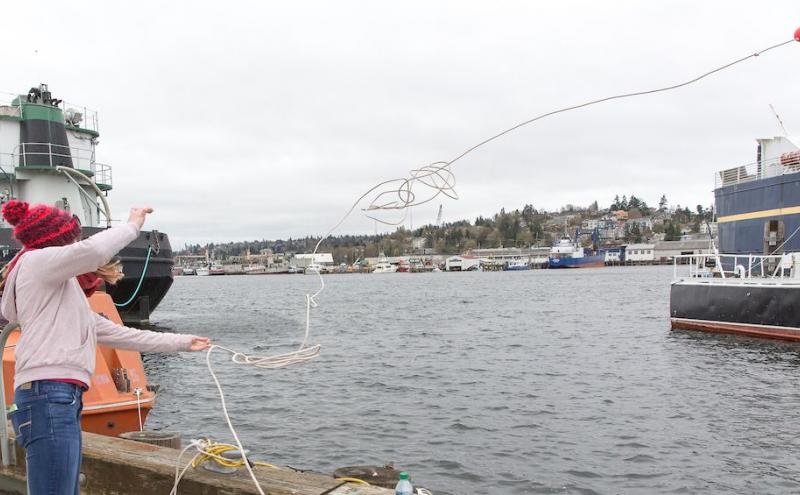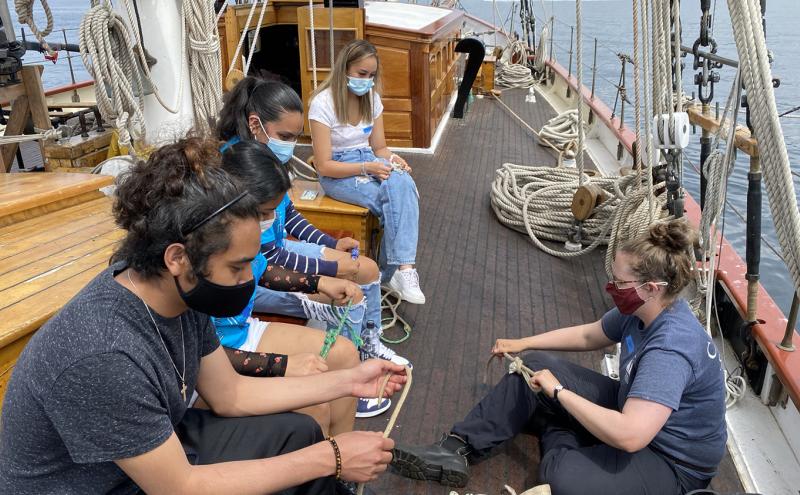
When Kevin Nguyen applied for the Youth Maritime Accelerator Project (YMAP), he was attracted to the $2,000 stipend and the chance to gain real world experience. But as Nguyen, 18, spent his summer between high school and college diving headfirst into the maritime industry, his eyes were opened to a sea of possibilities.
The eight-week summer program run by Washington Maritime Blue’s Youth Maritime Collaborative (YMC), introduces young people of color to the maritime industry through paid internships, experiential learning events, and thoughtful career exploration, while focusing on equity and inclusivity. YMAP is open to South King County youth, ages 18 to 24, through an application process that matches youth and maritime employers by skills and interests. The first cohort, which wrapped up in mid-August, included 12 students, a peer interpreter (made available through a partnership with El Centro De La Raza) , and three interns. Interns earned a $2,000 stipend paid in two installments.
The Youth Maritime Accelerator Project, launched in January 2020, is funded through a Port of Seattle South King County Fund Economic Recovery Grant. The grants program awards contracts to organizations serving communities most deeply impacted by the current economic crisis and connected to Port-related industries.
Blue pathways
The project creates a pipeline to the maritime industry, the third largest economic driver in Washington State, with a large percentage of the workforce nearing retirement age. The average age of maritime workers in Washington State is 54. Overall, the maritime industry projects a job shortage of 150,000 mariners by 2025. In addition, YMAP introduces young people of color to well-paying maritime careers, sustaining the health of the industry while opening new career pathways.
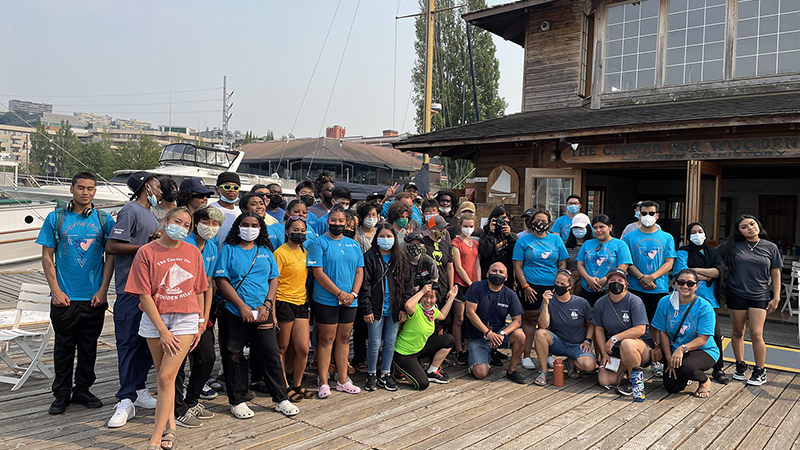
To help address this workforce gap, Maritime High School opened its doors this fall in Seattle, training today’s students for well-paid, meaningful, and lasting careers.
“We brought together youth of color from different walks of life who had experienced the same generational setbacks, and we were able to knock down some barriers and show them that they do belong,” said Robert Brown, YMAP Program Coordinator. “Going into it, they didn’t see a place for themselves in maritime, but now many are seeing maritime as a real possibility and opportunity. Every single student that participated now has a better understanding of their potential and what they can do. It gave them the leap of confidence that they can invest themselves and do what interests them, not just what is offered to them.”
Brown said being able to take a chance on youth the same way someone once took a chance on him creates a positive ripple effect.
“It creates a sense of belonging,” he said. “You don’t do anything and feel committed if you don’t feel like you belong. This breaks down the racial divide and opens them up to new possibilities. Many of the interns had never experienced that sense of collaboration or a sense of belonging in a setting like this.”
Veasna Hoy, YMC program director, said the maritime industry in WA state has been predominantly white, and youth of color in underserved communities have no visibility into the industry. YMAP seeks to remove these barriers through education and firsthand experience.
“We’re doing equity work and diversifying the workforce and being intentional about it, and we are seeing actionable results,” she said. “Our programming takes into account what it is like to live through institutional racism.”
Program facilitators are also young people of color, who spend every morning training participants in topics such as professionalism, communication, time management, confidence building, and problem-solving.
“Seeing black and brown people just like themselves, creates a sense of cultural understanding and belonging,” she said. “Youth are able to successfully learn a new skill in a new subject matter, and that can’t happen if they experience no connection. We are listening and working with employers and preparing young people to be skilled in various areas from blue technology to the trades. We want young people to know this industry is for them.”
During this summer’s program, participants spent four afternoons a week interning with a maritime employer, who all completed equity training before the program began. The experiential learning aspect of the program was the first time many participants had been out on the water. Experiences included a day on a century-old National Historic Landmark tall ship, kayaking, paddle boarding, museum trips, shipyard tours, and tour of a ferry boat captain’s office.
“Interns came into the program with no awareness of maritime and we provided them with experiences that are not available to them in their communities,” Hoy said. “We bridged the gap of young people ready to work and provided them exposure, experience, and professional development.”
Sea of possibilities
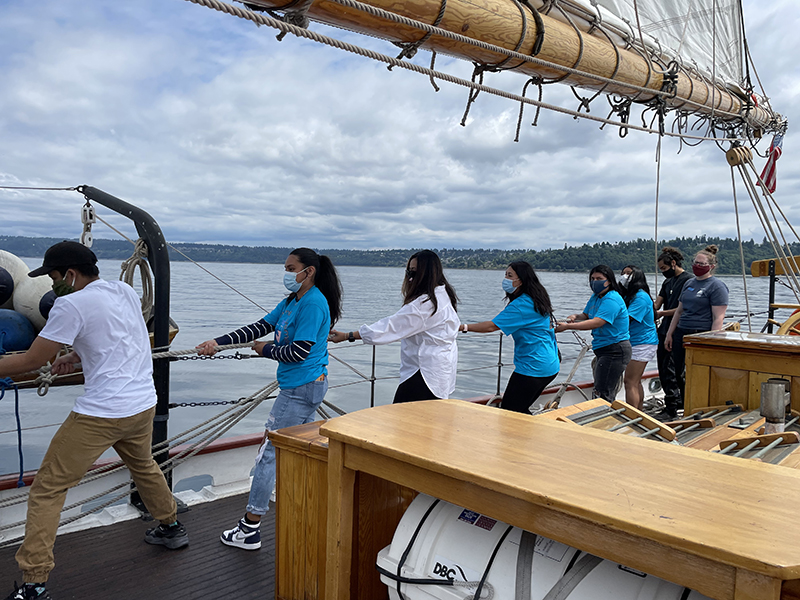
In the program, Nguyen was surprised by the range of maritime career opportunities on both land and sea, from mechanics to engineering, to ship navigation, to running an engine room on a wooden ship.
Nguyen graduated from Cleveland High School this spring, and will attend the University of Washington in the fall to pursue a career in engineering. His experience in the program opened his eyes to new maritime careers using his skillset.
Jesse Richman, a 23-year-old Seattle Central Community College student and YMAP intern, appreciated the focus on professional communication, which he said is helpful for any career he decides to pursue. Richman, who is studying marketing and psychology, worked with Fishtail AI, which rewards shippers for sustainable practices, to develop short videos about the company for social media advertising. This experience matched his background in music and video editing.
“The program has definitely opened my eyes to different career paths available in maritime,” Richman said. “Maritime isn’t just about being on a boat in the ocean. This was a great opportunity to explore something new and have experiences you may not have known existed before.”
Both Nguyen and Richman are continuing their employment beyond the program with their respective employers.
Program intern Juana Angel-Ramos and incoming Washington State University architecture student, spent her summer with MM-SEAS, a tech company that developed the first software to automate the manual task of obtaining, tracking, and renewing U.S. Coast Guard credentials. She helped the MM-SEAS team learn more about social media usage in the maritime credentialing process, and helped create a podcast with Washington Maritime Blue Executive Director Josh Berger.
“The maritime industry can be intimidating, but the best way to begin is to do the same as getting into the pool. You have to get in the water. I found the Washington State Maritime Blue Youth Maritime Accelerator Project as my way to get into the maritime industry.”
Through the program, Angel-Ramos was able to dip her toe in the water, discovering pathways to a naval architect career.
MM-SEAS co-founder and president Nate Gilman said mentoring and training young people like Angel-Ramos is key to growing a healthy blue economy for Washington State.
“I care deeply about workforce development and fostering the health of the industry,” Gilman said. “Programs like Washington Maritime Blue and the Youth Maritime Collective create a much-needed pipeline. They’re introducing the next generation to good paying jobs and also doing the work to help build an equitable and diverse maritime workforce. We need to be able to open the door to students like Juana who are smart and innovative but might not have maritime in mind for a career.”
Navigating the future
Hoy and Brown hope to lead a second YMAP cohort next summer if they can secure funding for 2022.
“This all is a product of what Port funding has done, believing in and supporting the youth,” Brown said. “We’ve seen impacts in just one year with the lives we are changing.”
In the meantime, YMAP has received funding to implement an expanded cohort model in the fall that includes six weeks of experiential learning per quarter through after-school programing. Hoy said the programming is also designed to further prepare youth for summer internships, including YMAP if it gets funded for next year. Program leaders are working with community organizations serving diverse youth to recruit and place participants.



